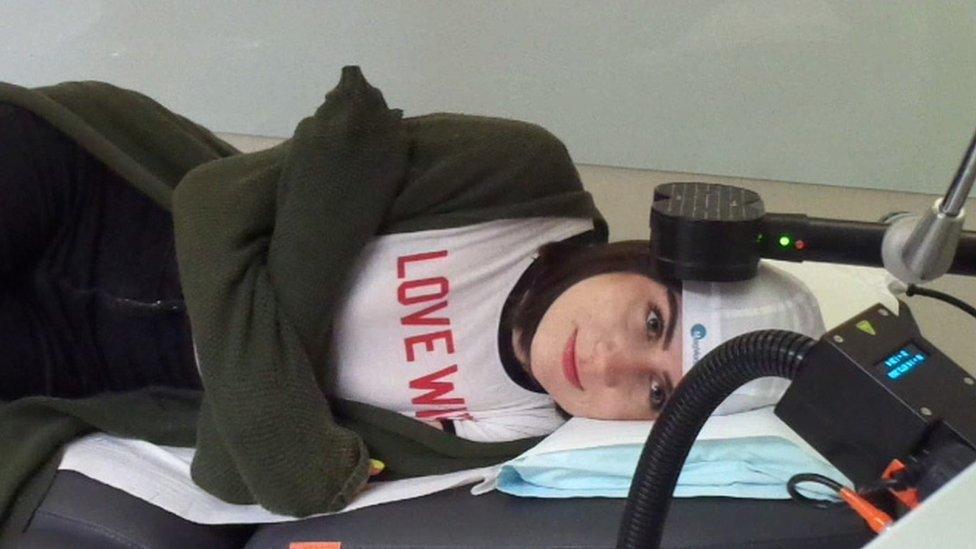Happiness bottled: Meet indie-pop supergroup Fizz
- Published
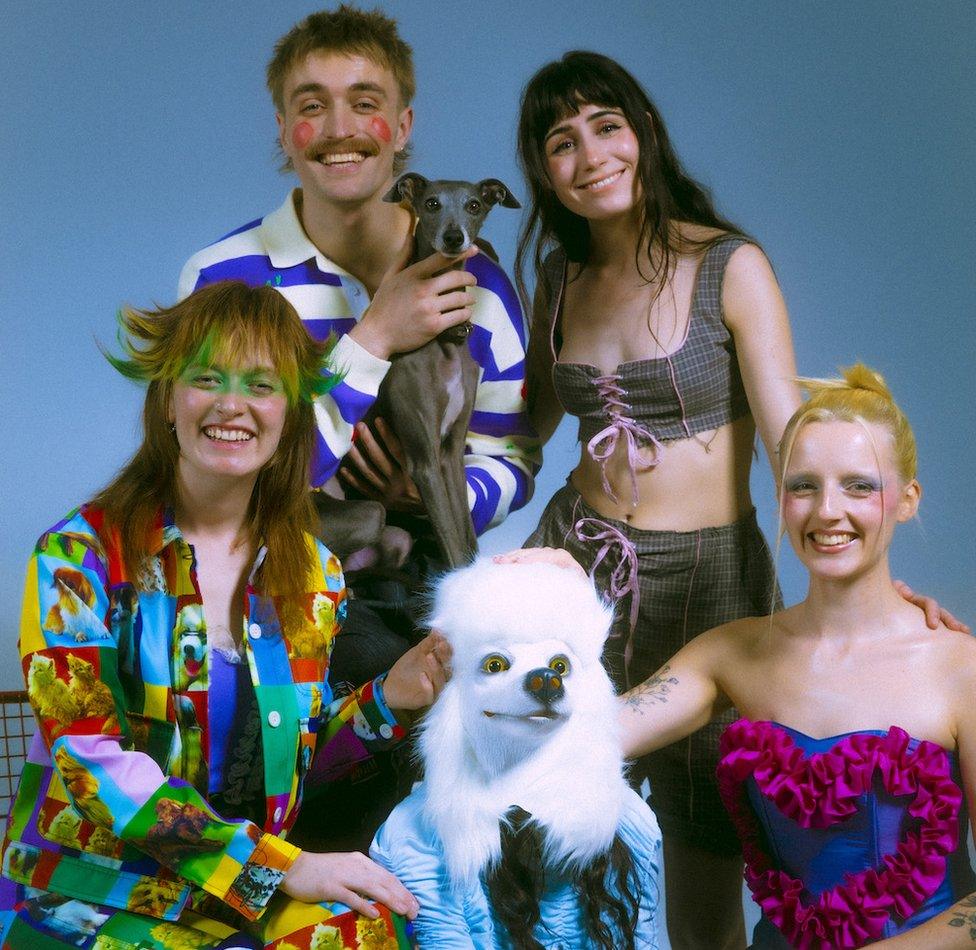
Paws-itive vibes... Fizz are (clockwise from bottom left) Orla Gartland, Martin Luke Brown, Dodie and Greta Isaac
It started as a way to blow off steam in the studio. Now it's become a fully-fledged psychedelic pop group.
That's Fizz - a sort of indie supergroup formed by Irish singer-songwriter Orla Gartland and her musical friends Dodie Clark, Greta Isaac and Martin Luke Brown.
Over the past 10 years, all four have achieved a degree of success as solo acts, with Orla and Dodie both scoring top 10 albums. But the music industry can be a lonely place when you're on your own. The pressure to create, promote, find money and drum up opportunities often becomes a treadmill.
"We'd been working on our own projects so hard and for so long that they started to feel like jobs," says Martin.
"I was like, 'I want to go on a holiday but still do music'."
Plans were hatched in a WhatsApp group. The quartet booked themselves into a studio in Devon and went crazy.
Over two weeks, they recorded an entire album from scratch, using every colour in the crayon box to create a giddy, freewheeling pop sound that shrugs off the straitjacket of streaming algorithms.
"We were like, 'Let's play, with no thoughts about what playlist the music's going to be on'," says Martin.
"We wanted to be completely uncorrupted and have a laugh... And as soon as the chains were off, of course there were so many ideas."
"It happened so fast," adds Orla. "We didn't have time to overthink it. No-one was like, 'Ooh, is this guitar part right?' It was all done on pure instinct.
"I think it sounds like happiness bottled."
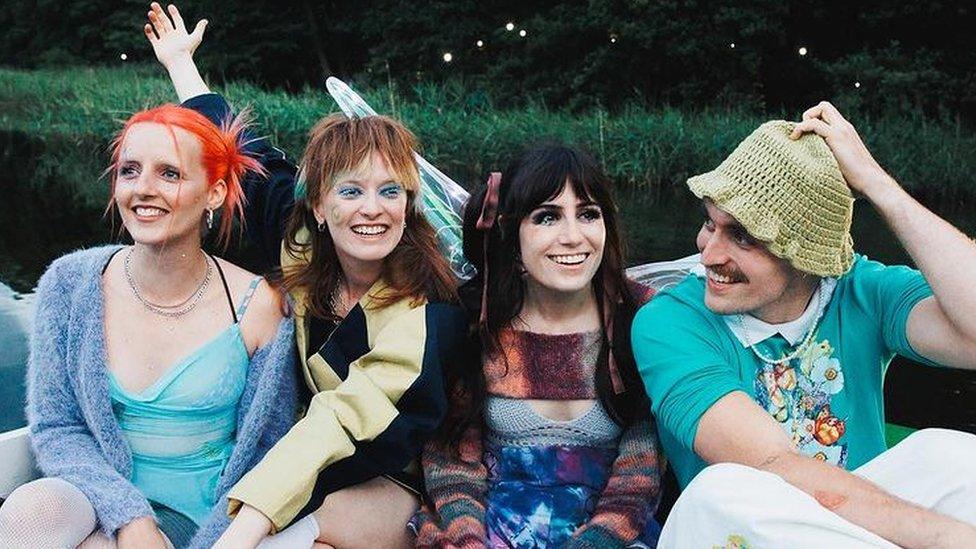
The band arrived for their set at the Latitude Festival by boat
With this anything-goes approach, producer Pete Miles encouraged the group to pick up instruments they'd never played before, from clarinets to pipe organs.
Vocals were recorded as a gang, standing in a circle, rather than isolating each voice to obtain a clean recording.
"Pete understands that if we spend too much time getting everything sounding really polished, everyone starts to feel lethargic and demotivated," says Greta.
"He really focuses on capturing the energy, and we definitely just sing differently when we're all together."
For Greta, this even involved singing in character as "two old ladies" for the backing vocals on the single High In Brighton.
"Silliness is definitely good and to be celebrated in this band - and perfection doesn't matter," she laughs.
Indeed, if you listen to the individual vocal recordings (which the band kindly shared on their podcast, external), there's what you might call a relaxed attitude to pitch. Mariah Carey this is not. Instead, the music gains a giddy sense of fun and togetherness.
"All together, we sound so powerful," says Dodie. "But if you take everyone else away and it's just your vocal, you sound like a child."
'Slightly feral'
The history of supergroups is not an auspicious one. From Superheavy (Mick Jagger and Joss Stone) to Hollywood Vampires (Alice Cooper and Johnny Depp), they're regularly less than the sum of their parts.
Unused to musical democracy, members make compromises and concessions that dilute what makes them unique.
The opposite seems to have happened for Fizz. Maybe it helps that Dodie, Greta and Martin share a flat, so the group dynamics were already in place. Or maybe it's because they've established a musical shorthand by working on each other's projects.
"I know exactly what you mean about how the edges can get sanded off," says Orla, "and I think if we didn't know each other so intimately, that could have happened. But instead it was about pushing each other to be braver and more confident and more untethered and just slightly feral.
"You know, Dodie sings famously quietly but this was like, 'Dodie, get out there and yell!'"
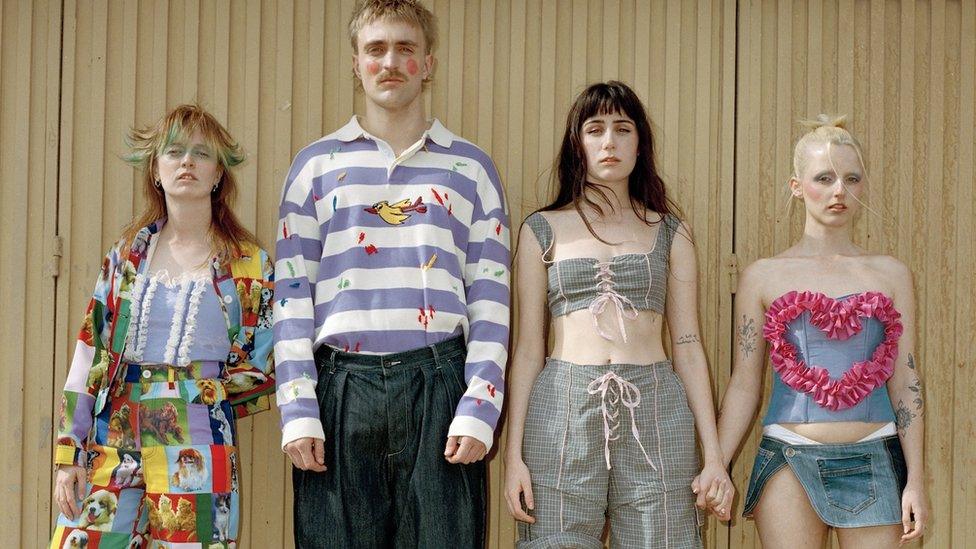
The group say they want to bring back a sense of 'theatricality' to pop music
When it came to lyrics, the guardrails were off. Strawberry Jam is an ode to the simple pleasures of afternoon tea; Hell Of A Ride is the story of a man who builds a bunker after being brainwashed by a doomsday prophet; while Martin contributed a song about his addiction to video game Rocket League.
But amid the whimsical free association, one song stands out for its vitriolic sarcasm.
As Good As It Gets is a furious response to being patronised and spoken over, having your opinions dismissed and being told to smile and look pretty - experiences that all three of Fizz's female musicians are familiar with.
"There are hundreds and hundreds of those small moments that build up inside you. And that song is like the kettle boiling over and going 'Agggggh'," says Greta.
Martin talks with disbelief of the times he's seen Greta's talents belittled by male counterparts.
"Greta's got this way of playing guitar that so odd. She does these weird chord shapes that no-one ever does and it's so cool.
"But, especially in London, you're so conscious of money and time that, if you can't get the guitar part down quickly, it'll be like, 'The engineer plays guitar, just pass it to him'. And Greta and I have been in so many sessions where that's been the case."
Rebelling against those experiences brought the song to life - with Martin stepping back from vocals, and allowing engineer Soren Bryce to take his spot.
"I don't think I've ever experienced anything like singing that song," says Greta. "I had a lot of anger, that day, in my body and recording those vocals all together was so cathartic.
"It really felt like a moment of inherently knowing your worth and what you deserve as a person. I was like, 'This is what singing is - processing emotion and getting it out in a sort of guttural way."
She leaves a thoughtful pause. "It was really, really guttural."
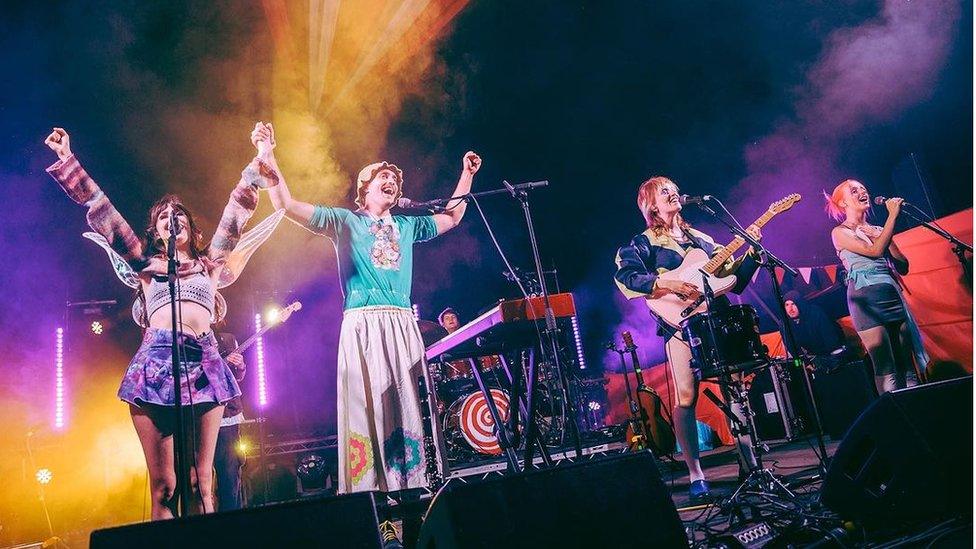
The band's live shows are as irrepressibly bouncy as their debut album
When the two-week session ended, no-one was sure where the music would go.
"We didn't even send it to our managers at first," Orla admits. "They were asking us for months and we were like, 'No chance'."
"Everyone was like, 'Do we want to release it? I don't know'," adds Greta. "But when the whole thing was mixed, we were like, 'Yeah! We really want to spread it'."
Fizz made their debut at the Great Escape Festival in May and signed to Decca Records soon after. The album is due in October and, in tandem with the music, there's a lack of inhibition to their presentation.
Speaking at July's Latitude Festival, the quartet are kitted out in colourful outfits from their childhood.
"I'm dressed like a baby," laughs Martin. "If you saw a five-year-old wearing this you'd be like, 'Oh my God, cute!' But because it's me, in my 20s with a moustache, I'm getting some interesting looks!"
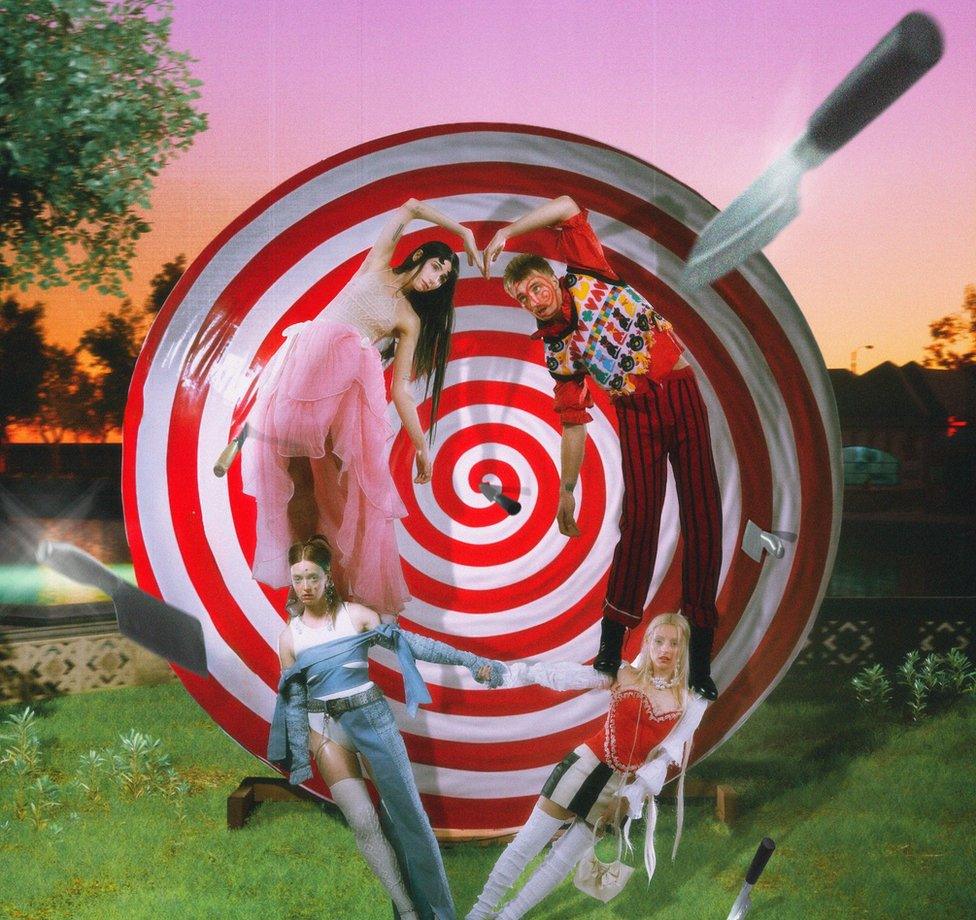
The band's high concept artwork has already spawned imitations
The Harlequin aesthetic extends to their artwork and music videos, which are set in a fictional theme park called Fizzville. And although it's still early days, fans are starting to adopt the look.
"Everyone's definitely on board with the circus vibe, Willy Wonka chic," says Martin.
"Even online, we're getting tagged in a lot of messages from people who are dressed up and saying, 'I'm feeling very Fizz today'," adds Orla.
"The band seems to be encouraging people to be creative and elaborate and loud."
"I think we're missing theatre in pop music," Greta agrees. "We had it with Queen and Abba, that high-camp theatricality, inviting people to let go of themselves."
And that, says Martin, is what makes the band special.
"When I was a kid, that's all I wanted from the show: To be outside of myself.
"If something's too cool, you shrink. You feel like you have to like play the role of a cool person in a cool crowd.
"It's nice to just be, like, part of a big group of people screaming."
Related topics
- Published25 July 2017
